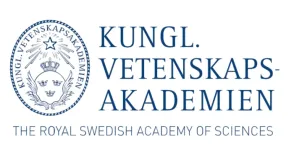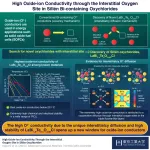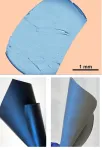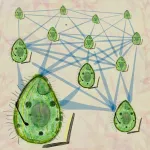(Press-News.org) Does a commitment to one’s God facilitate altruistic behavior that benefits only members of the same religious group? Or does it extend to helping members of a different religion?
University of Illinois Chicago social psychologist Michael Pasek and colleagues examined this question through field and online experiments involving more than 4,700 people from diverse ethnoreligious populations in three political and cultural contexts.
Christians, Muslims, Hindus and Jews in the Middle East, Fiji and the United States were given the opportunity to share money with anonymous people from different religious groups.
The study, which appears in the journal Psychological Science, found participants showed more generosity toward strangers when prompted to think about God. Moreover, participants’ giving increased equally no matter if recipients were members of the same religious group or a different group.
“Religion is often thought to promote intergroup conflict and fuel hostility between people who hold different beliefs. Quite to the contrary — our findings suggest that belief in God, which is an important aspect of most world religions, may sometimes promote more positive intergroup relations,” said Pasek, UIC assistant professor of psychology, who is a lead author on the study.
The researchers had participants play multiple rounds of a real economic game in which they divided a sum of money between themselves and different individual recipients.
Participants were asked to think carefully before making their choice during the initial rounds. In the latter rounds, researchers asked participants to think about God before making their choice.
Thinking about God led to an 11% overall increase in giving (relative to what they gave at first) across experiments and sites, regardless of conflict levels or perceived threat.
According to Jeremy Ginges, professor of psychology at The New School of Social Research and one of the study’s lead authors, the results suggest that thinking about one’s God may promote cooperation across religious divides, rather than assumed antipathy, but it is unlikely that such beliefs always promote harmony.
“Belief in gods may encourage cooperative norms that help us trade goods and ideas across group boundaries, which is essential to human flourishing. Of course, we are also a parochial species. Our team is now investigating how moral and supernatural beliefs help people balance their parochialism with their need for intergroup cooperation,” Ginges said.
In addition to Pasek and Ginges, co-authors of the paper are John Michael Kelly, Crystal Shackleford, Cindel White, Allon Vishkin, Julia Smith, Ara Norenzayan and Azim Shariff.
This research was supported by the Templeton Religious Trust, the National Science Foundation and the Social Sciences and Humanities Research Council of Canada.
END
Study explores prosocial behavior within, between religious groups
2023-04-19
ELSE PRESS RELEASES FROM THIS DATE:
Bad medical news causes patients to choose brand name drugs over generics, costing billions
2023-04-19
Researchers from Johns Hopkins University published a new Journal of Marketing article that examines how receiving negative medical results might affect how people choose between generic and brand name drugs.
The study, forthcoming in the Journal of Marketing, is titled “Does Bad Medical News Reduce Preferences for Generic Drugs?” and is authored by Manuel Hermosilla and Andrew T. Ching.
At the height of the COVID-19 pandemic, Manuel Hermosilla received a call from a family friend in Chile who had been recently diagnosed with cancer. The friend needed help tracking down Hydroxychloroquine to treat ...
Healthy ageing and longevity: topic for scientific meeting on Okinawa
2023-04-19
The Japanese island Okinawa is known for its high number of centenarians, healthy diet and lifestyle. Due to this it is one of the few areas in the world that is called “blue zone”. During May 12-13, leading international scientists and inspiring speakers will meet on Okinawa for two full days of talks about the latest research on longevity and healthy ageing – and what we can learn from so called “blue zones”.
“It is a perfect place to interact, update and develop the research ...
Fluorescent blue coumarins in a folk-medicine plant could help us see inside cells
2023-04-19
Plants that glow under ultraviolet (UV) light aren’t only a figment of science fiction TV and movies. Roots of a traditional medicine plant called the orange climber, or Toddalia asiatica, can fluoresce an ethereal blue hue. And now, researchers in ACS Central Science have identified two coumarin molecules that could be responsible. These natural coumarins have unique fluorescent properties, and one of the compounds could someday be used for medical imaging.
Fluorescent substances take in UV light that’s directed ...
Nagoya University researchers in Japan develop a new ultra-high-density sulfonic acid polymer electrolyte membrane for fuel cells
2023-04-19
In a project commissioned by the New Energy and Industrial Technology Development Organization (NEDO), researchers at Nagoya University in Japan have developed poly(styrenesulfonic acid)-based PEMs with a high density of sulfonic acid groups.
One of the key components of environmentally friendly polymer electrolyte fuel cells is a polymer electrolyte membrane (PEM). It generates electrical energy through a reaction between hydrogen and oxygen gases. Examples of practical fuel cells include fuel cell vehicles (FCVs) and fuel cell combined heat and power (CHP) systems.
The best-known PEM is a membrane based on a ...
UVA-developed artificial pancreas benefits both kids and adults with diabetes, new analysis finds
2023-04-19
An artificial pancreas developed at the University of Virginia Center for Diabetes Technology improves blood sugar control for people ages 2 to 72 with type 1 diabetes, according to a new combined analysis of three clinical trials.
Across the three trials, participants using the artificial pancreas spent an average of 2.8 more hours per dayin their target blood sugar range compared with participants in control groups who used standard methods for managing their blood sugar.
Manufactured by Tandem Diabetes Care and sold as the Control-IQ system, the artificial pancreas is ...
Novel oxychloride shows high stability and oxide-ion conduction through interstitial oxygen site
2023-04-19
Solid oxide fuel cells (SOFCs) are a promising solution to the contemporary problem of the impending global energy crisis. SOFCs show high efficiency, lower emissions, and have low operating costs, making them an ideal power source for a fossil fuel-free society.
Conventional SOFCs with yttria-stabilized zirconia (YSZ) electrolytes have high operating temperatures (700–1000°C), and their widespread adoption has been limited by their degradation issues and high cost. Therefore, there is a need ...
UCR team creates “quantum composites” for various electrical and optical innovations
2023-04-19
A team of UCR electrical engineers and material scientists demonstrated a research breakthrough that may result in wide-ranging advancements in electrical, optical, and computer technologies.
The Marlan and Rosemary Bourns College of Engineering research group, led by distinguished professor Alexander Balandin, has shown in the laboratory the unique and practical function of newly created materials, which they called quantum composites.
These composites consist of small crystals of called “charge density wave quantum materials” incorporated within a polymer (large molecules with repeating structures) matrix. Upon heating or light exposure, charge density wave material ...
Black and socioeconomically disadvantaged patients with vascular disease have worse symptoms, bypass outcomes
2023-04-19
A Michigan Medicine study finds that Black and socioeconomically disadvantaged patients with a common vascular disease have more severe symptoms before bypass surgery – and are at greater risk for amputation and other complications after the procedure.
The analysis zeroed in on more than 7,000 patients with peripheral arterial disease, when the vessels carrying blood from the heart to the legs are blocked by plaque, who underwent lower extremity bypass to improve circulation. The data was available through the Blue Cross Blue Shield of Michigan Cardiovascular Consortium database.
Investigators found ...
Prenatal depression may be linked to cardiovascular disease after childbirth
2023-04-19
Research Highlights:
A study of more than 100,000 people in the U.S. has found an association between individuals’ psychological well-being during pregnancy and their risk of developing cardiovascular disease within two years of delivery.
The most significant association was between depression and ischemic heart disease, with individuals with depression having an 83% higher risk of developing the condition than those without a depression diagnosis.
The increased risk of cardiovascular disease was found even among individuals without high blood pressure ...
Eco-computing
2023-04-19
Kyoto, Japan -- Development of neural networks or AI tools for data analysis is increasing exponentially. However, networks existing in natural ecosystems, such as webs of interspecies relationships, have information processing potential that has largely remained untapped.
Now, a study conducted at Kyoto University has demonstrated the computational power of ecosystems, providing a new direction for rapidly developing AI technologies. Simulations have confirmed that ecological networks, such as prey-predator interactions, can efficiently process information and be utilized as a computational resource.
"We have named this approach ecological reservoir computing," ...






